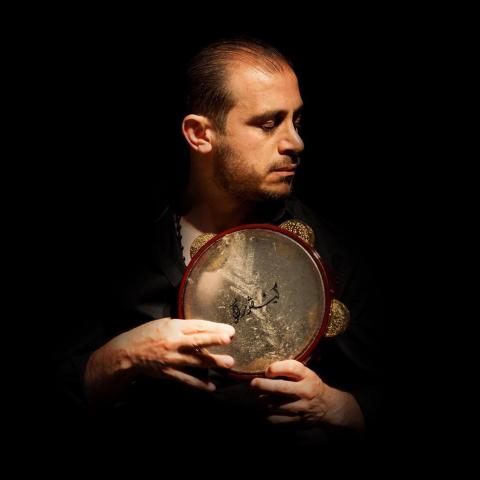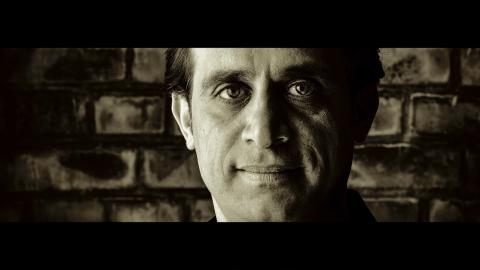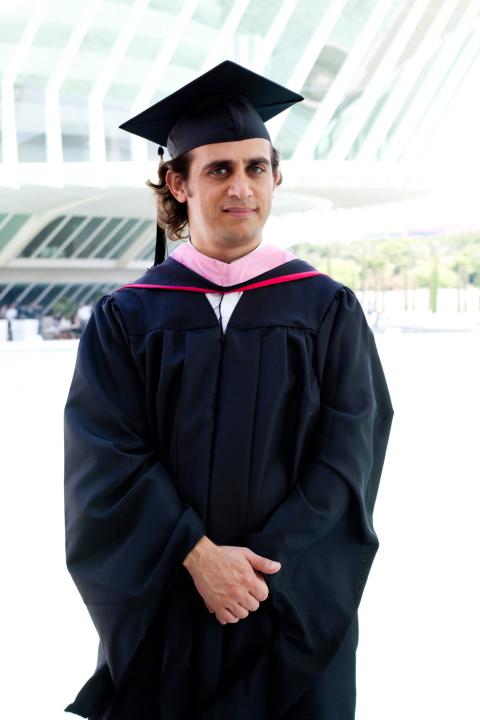Firas Hassan Works to Save and Spread Syrian Music

Firas Hassan M.M. '15
Ellen Schmauss

Firas Hassan M.M. '15
Courtesy of the artist

Firas Hassan M.M. '15
Histeria Producciones
Firas Hassan’s audition for Berklee in April 2012 fell on a Friday, the day the internet always slowed down in Syria since the civil war started a year prior. He had a friend in Lebanon with a good internet connection, and traveling across the border hadn’t yet become difficult.
Hassan packed his darbuka and riq—two traditional Arabic percussion instruments—in his car and drove for nearly three hours to his friend’s place to perform the audition over Skype. The performance resulted not only in acceptance to Berklee's graduate program in contemporary studio performance, but in a scholarship as well. Five months later, he left Damascus again, this time with no foreseeable plans for return.
“I never felt that I wanted to leave Syria, even during the war. But the situation became really bad,” he says.
Though there are still concerts in Syria and the opera house in Damascus is still in operation, Hassan says that many of his musician friends can’t make a living, and many good musicians have fled.
“Musicians were the first community to lose their jobs during this war,” he says.
Music in Exile
By going to Berklee, Hassan not only saved himself, but perhaps he may have helped save some of his culture's music. It was during his time at the college's campus in Valencia, Spain, that he started a project to record Syrian songs that have been handed down through oral tradition. It's a project he's still chipping away at outside of his current job as a teacher of Arabic Middle Eastern percussion at Pop Akademie in Mannheim, Germany, where's he's been the past nine months.
“A lot of things from the heritage, from the culture, I’m afraid will disappear in this dirty war,” Hassan, 37, says.
Back in Syria, he had been one of the few traditional percussionists who had studied ear training and music theory in depth and who could also read Western notes, having studied music for six years at the Lebanese National Higher Conservatory of Music and earned diplomas in darbuka and riq performance.
The breadth of his expertise landed him a job as the only teacher of Arabic percussion at Damascus Conservatory. As of 2012, a year after the Syrian Civil War started, he had taught at the university for six years. Throughout those years, he traveled to Europe regularly to perform concerts and to present Syrian music to the wider world. Though he had family in Europe, at no time did he consider trying to stay in the continent. But when he got accepted to Berklee, he thought, "This is the moment to leave, to do something to improve my knowledge, my career."
Fusion and Integrity
At Berklee, Hassan was able to explore his interest in flamenco, Latin music, and jazz, and he began to re-examine his own music.
"This experience made me really think about my heritage and my music in a different view, a different dimension. I started looking for different sounds," he says.
At the same time, he wanted to be careful not to change the character of the music. It's a lesson he passes on at Pop Akademie today.
"I always try to explain for students that you need to be open but you must keep your identity, your sound of the area, because otherwise you will disappear."
Hassan also keeps this objective in mind with his project to save pieces of Syrian music. Often, if they are recorded, it is in a highly Westernized and commercialized style, and they lose their identity, he says.
After his time at Berklee, Hassan stayed in Spain for another year on a fellowship and then he left for Belgium to apply for asylum. He chose to apply in Belgium since he speaks French. However, he found work hard to come by, and left for Germany when the Pop Akademie opportunity arose. Hassan says that many European students are interested in learning the darbuka and riq, and this makes him happy.
"I enjoy sharing my knowledge with my students, and I see them playing and touching this spirit of the Middle East," he says.
And in this way, too, he helps keep Syrian music alive.
